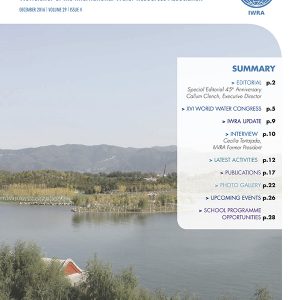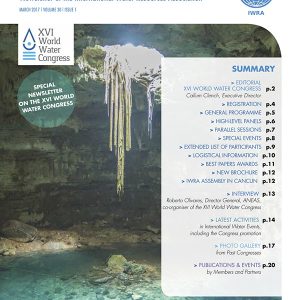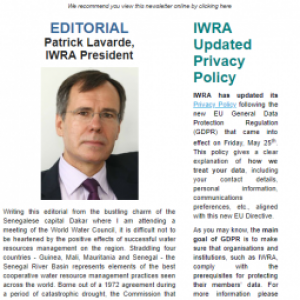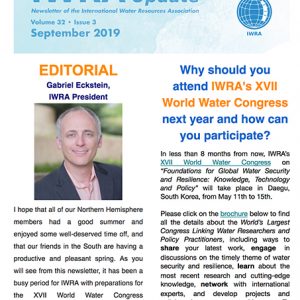
Callum Clench, IWRA Executive Director
Our new reality means that the subject of COVID-19 – and how it is affecting our day-to-day lives – is often a mainstay of conversations with our colleagues, friends and family. Equally, and like every other industry sector, we find ourselves reflecting on the impact of the pandemic for water resource management.
Many of you will be aware that we held a webinar at the end of April on COVID-19 and water. It prompted a very high level of interest. This month, we also published a policy briefthat distils some of the key messages raised during that webinar. Notably, the pandemic has reminded us of water’s unique role in keeping people safe during infectious disease outbreaks. The importance of best practice hygiene and sanitation to control transmission was already well understood. But, the pandemic also demonstrates the water sector is an essential service to maintain clean water supplies, manage waste, and monitor the spread of disease.
However, that role creates added pressure on water sanitation systems as the increased use of sanitizers and cleaning materials increase the load of contaminated waste. The other challenge is the on-going maintenance and upkeep of water systems. Even the best-laid plans for water infrastructure upgrade and repairs were knocked sideways by the pandemic. That can be problematic, our experts reminded us.
Perhaps one of the most encouraging lessons we took from our webinar, was understanding how surveillance mapping of wastewater can reveal the spread of a pandemic. Monitoring tools within sewage systems are particularly effective at identifying disease hotspots, which in turn can inform public health decision-making.
As some countries emerge from lockdowns, while others are going into second waves of disease control restrictions, it is clear we have a long way to go in understanding the course of this virus, let alone in finding effective treatments, and vaccines. It is an inordinate challenge for those working in the health sector as well as decision-makers in public office. And sadly it has also forced IWRA and our partners in Korea to postpone for a second time the XVII World Water Congress from September this year to September 2021. As I said earlier – the best-laid plans are being knocked sideways.
Finally, what is becoming clear is the need of water resource expertise to be sitting at the top table in helping to inform how the spread of the disease can be anticipated through water sanitation infrastructure, as well as in finding solutions to the public health challenge that affects communities, often the most vulnerable, where access to clean water is limited. IWRA will continue to advocate that water is not forgotten during this global crisis.
I encourage you to watch again IWRA’s COVID-19 webinar via our website and to read the accompanying policy brief. In the meantime, stay safe and keep well.




